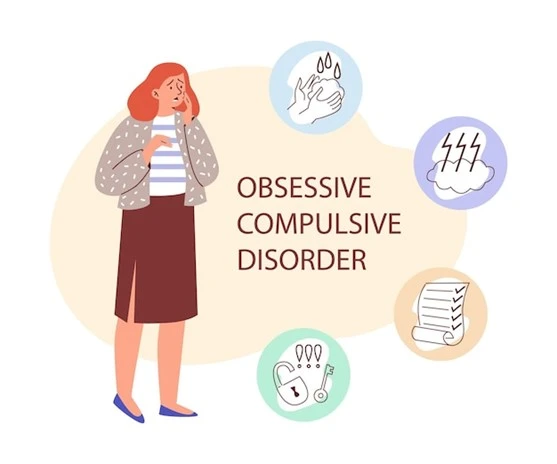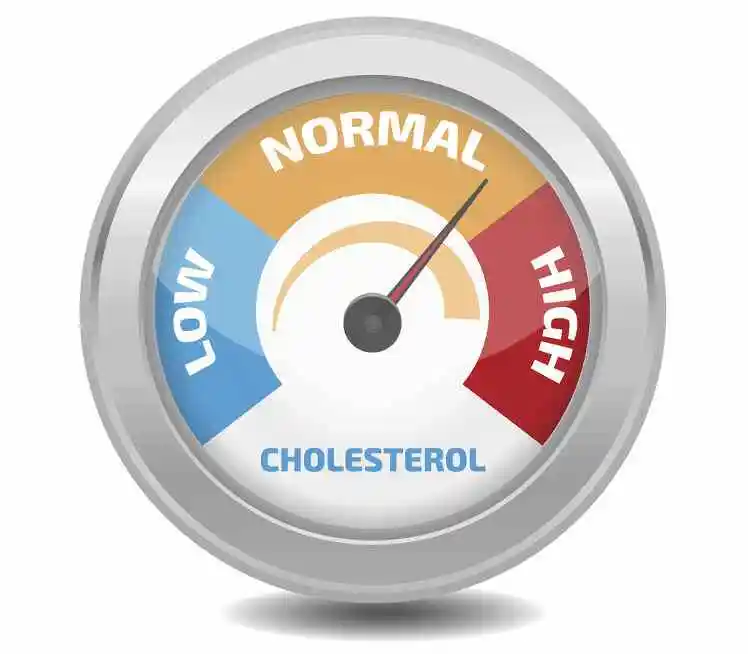Obsessive Compulsive Disorder (OCD)
OCD: What is it?
Obsessive-compulsive disorder (OCD) is a disorder in which you engage in repetitive activities (compulsions) as a result of frequent undesirable thoughts and feelings (obsessions). Social relationships and carrying out everyday duties may be severely hampered by the repeated habits.
OCD is often a chronic (lifelong) disorder, however symptoms may fluctuate over time.
Everyone has compulsions and obsessions from time to time. For instance, it is typical to periodically check the locks or the stove again. In informal speech, people also frequently use the terms “obsessing” and “obsessed.” On the other hand, OCD is more severe.
A person’s day may be consumed by it for several hours. It interferes with day-to-day activities and living. OCD sufferers do not like engaging in obsessive activities, and their obsessions are undesirable.
Can you explain the distinction between OCPD and OCD?
Despite their similar names, obsessive-compulsive disorder and obsessive-compulsive personality disorder are two distinct disorders.
A personality condition called OCPD results in a severe obsession with control, organization, and perfectionism.
OCD sufferers often recognize the negative effects of their obsessions and compulsions and acknowledge that they require medical assistance to manage the disorder. The majority of people with OCPD do not believe that their views and actions are flawed.
Who is affected by OCD?
Anyone can get OCD. The onset age is typically 19 years old. OCD symptoms usually start in childhood or adolescence for around half of those who have the disorder.
It is uncommon for someone over 40 to acquire OCD.
What is the prevalence of obsessive-compulsive disorder (OCD)?
A fair number of people suffer from obsessive-compulsive disorder. 1.6% to 2.3% of the US population as a whole are affected.
What OCD symptoms are present?
Obsessions and compulsive behaviors that disrupt everyday tasks are the primary signs of OCD. For instance, you could frequently be unable to get at work on time due to symptoms. Or you could find it difficult to get ready for bed in a timely manner.
Even though you may be aware that these symptoms are troublesome, you are unable to stop them. OCD symptoms may appear and disappear, become better with time, or get worse with time.
You should speak with a healthcare professional if your kid or you have OCD symptoms that interfere with day-to-day functioning.
OCD Obsessions
Obsessions in obsessive compulsive disorder are unwelcome, intrusive thoughts or pictures that trigger severe distress. These ideas are uncontrollable for OCD sufferers. Most OCD sufferers understand that these beliefs are unreasonable or nonsensical.
Typical instances include of:
- Fear of coming into touch with potentially contaminated materials, including dirt or pathogens.
- Fear of hurting yourself or someone else due to excessive carelessness or a violent desire.
- unwanted sex-related ideas or pictures in the mind.
- Anxiety over making a mistake.
- too preoccupied with morals (“right or wrong”).
- feelings of revulsion or uncertainty.
- severe anxiety related to your gender identity or sexual orientation.
- The need for neatness, order, symmetry, or perfection.
- Reassurance must be given continuously.
OCD Compulsions
Repetitive behaviors that you feel compelled to perform in order to alleviate or eliminate your obsessions are known as compulsions in OCD.
Individuals who suffer from obsessive-compulsive disorder do not enjoy engaging in these compulsive habits. However, they believe that they must perform them or else their anxiousness would worsen. But compulsions are simply a short-term solution. In a short time, the compulsions resurface as the obsessions do.
Compulsive behaviors take up time and interfere with valuable and significant tasks. Your obsessions do not have to be related to them.
A few examples are:
- putting stuff on your dresser or other objects in a very exact arrangement.
- taking a bath, cleaning, or repeatedly washing your hands.
- gathering or accumulating things that are worthless financially or personally.
- often inspecting doors, switches, and locks, among other items.
- making sure you have not hurt anyone.
- always looking for confirmation.
- Number-related rituals include counting, doing a task a certain number of times, or overly favoring or avoiding particular numbers.
- uttering specific phrases or prayers while working on unrelated projects.
Avoiding circumstances that arouse obsessions is another example of a compulsion. Avoiding handshakes and touching items that other people frequently touch, such as doorknobs, are two examples.
For what reasons does OCD occur?
It is unknown to researchers what causes OCD. Nonetheless, they believe that a number of elements influence its growth, such as:
- Genetics: Research indicates an increased risk of OCD in those with a first-degree relative (biological parent or sibling) who has the disorder. Relatives who experienced OCD as children or teenagers are at a higher risk.
- Brain alterations: Imaging research has revealed that OCD sufferers have altered frontal cortex and subcortical brain regions. Tourette’s syndrome, epilepsy, Parkinson’s disease, and other neurological disorders that impact comparable brain regions are also linked to OCD.
- The acronym PANDAS stands for “pediatric autoimmune neuropsychiatric disorders associated with streptococcal infections.” It outlines a collection of illnesses, including scarlet fever and strep throat, that can strike kids who have had strep infections. Among these is OCD.
- Childhood trauma: According to certain research, the emergence of OCD is linked to childhood trauma, such as abuse or neglect.
Evaluation and Diagnosis
In what ways is OCD diagnosed?
For OCD, there is no test. A medical professional asks you about your symptoms and medical and mental health history before making the diagnosis. The Diagnostic and Statistical Manual of Mental Disorders, Fifth Edition (DSM-V) provides criteria that clinicians use to diagnose OCD.
The requirements consist of:
- having compulsive behaviors, obsessions, or both.
- More than an hour a day is devoted to the compulsions or obsessions.
- Your involvement in social activities, job obligations, or other life events may be impacted by the obsessions or compulsions, which can also create discomfort.
- The symptoms are not brought on by drugs, alcohol, prescription drugs, or any other illness.
- The symptoms cannot be attributed to another mental illness, such as eating disorders, body image disorders, or generalized anxiety disorder.
Management and Therapy
How are OCD symptoms maintained?
Psychotherapy, sometimes known as talk therapy, and medication are the most popular treatment plans for OCD.
Your doctor could suggest transcranial magnetic stimulation (TMS) if this treatment is ineffective and your OCD symptoms are severe.
Psychotherapy for OCD
A range of therapeutic approaches are referred to as psychotherapy, or talk therapy, with the goal of assisting you in recognizing and altering maladaptive feelings, ideas, and actions. You collaborate with a mental health specialist, such a psychologist.
Psychotherapy is divided into many categories. The most popular and successful methods for treating OCD are as follows:
- Cognitive behavioral therapy (CBT): A therapist will assist you in analyzing and comprehending your feelings and ideas. CBT can help cease unpleasant behaviors and harmful beliefs over the course of several sessions, possibly substituting them with more healthy coping mechanisms.
One kind of cognitive behavioral therapy is exposure and response prevention, or ERP. ERP involves a therapist exposing you to pictures or circumstances that you are afraid of and asking you to resist the temptation to carry out a compulsion. Your therapist could, for instance, encourage you to handle unclean things but forbid you from washing your hands. You can discover that your nervous thoughts are only ideas and not necessarily reality by being in a scenario you fear without anything bad happening. - Acceptance and commitment therapy (ACT): ACT teaches you to take power away from obsessive ideas by accepting them as just that—thoughts. You may learn to live a meaningful life in spite of your OCD symptoms with the support of an ACT therapist.
- Meditation and relaxation are examples of mindfulness practices that can also aid with symptoms.
OCD medication
OCD may be treated with drugs such as tricyclic antidepressants, selective serotonin reuptake inhibitors (SSRIs), and serotonin reuptake inhibitors (SRIs).
SSRIs are typically prescribed at significantly greater dosages for OCD than for anxiety or sadness by medical professionals. SSRIs that have been authorized by the US Food and Drug Administration (FDA) include:
- fluoxetine.
- Fluvoxamine.
- Paroxetine.
- Sertraline.
- The time it takes for these drugs to start functioning might be eight to twelve weeks.
Preventive
Can I avoid OCD?
OCD cannot be prevented. However, its consequences on your life and its symptoms can be lessened with early diagnosis and treatment.
What is OCD’s prognosis?
OCD’s prognosis, or outlook, might change. OCD is frequently a chronic illness that fluctuates in intensity.
When OCD sufferers obtain the right care, they frequently report higher quality of life and better functioning in their social, academic, and/or professional lives.
Without therapy, structural changes in your brain occur, making it more difficult to stop and cure the cycle of obsessions and compulsions. As a result, if you or your kid exhibit symptoms, it is critical to get medical help right once.
If I suffer from OCD, how do I care for myself?
Self-care can help you manage your symptoms in addition to getting medical treatments for OCD. As examples, consider:
- Follow your treatment regimen: OCD symptoms can fluctuate, and if your therapy is effective, you could believe that you have been “cured.” However, it is crucial to continue taking your medicine and putting what you have learned in treatment into practice. Stopping might make you feel worse. Additionally, stopping an SSRI abruptly might be risky. You may stay motivated by concentrating on your objectives.
- Keep an eye out for triggers: Develop a plan to deal with the circumstances that might exacerbate your symptoms by working with your physician to identify them. That does not imply you should stay away from those circumstances; having a job, interests, and social life should not be hindered by OCD. Keeping occupied might also help you avoid obsessive thinking.
- Expect setbacks and celebrate victories: Most likely, you will have an abundance of both. Remind yourself that dealing with OCD will be a continuous journey. It will not get better right now. However, please acknowledge your progress, no matter how small.
- Take note of your general mental well-being: Numerous OCD sufferers are also at a high risk of attempting suicide and have additional psychiatric problems such as anxiety disorders, depression, or drug addiction. Inform your physician if you have any new symptoms or if your current symptoms appear worse.
- Get educated: Get as much knowledge as you can on OCD and its management. Stay informed on the most recent developments in treatment methods.
- Be kind to yourself: Regular exercise, adequate sleep, and a good diet will probably make you feel better overall. Since stress can exacerbate OCD symptoms, recognize when it is beginning to build up and develop coping mechanisms.
- Obtain assistance: Making connections with people who have OCD can be beneficial. Find local support groups online or by asking your doctor.
- obtaining a good rest.
- consistently working out.
- eating a nutritious diet.
- interacting with family members that understand OCD and are supportive of you.
- using methods of relaxation including yoga, meditation, massage, and visualization.
- joining an online or in-person support group for OCD sufferers.
When should I discuss OCD with my healthcare provider?
If you or your kid has been diagnosed with obsessive-compulsive disorder, you will probably need to see your doctor and/or mental health specialist on a frequent basis to ensure that your treatment is effective.
Consult your healthcare practitioner if you experience any unpleasant side effects while using OCD medication.
FAQs
How does OCD affect daily life?
People with OCD may find it difficult to carry out daily tasks including eating, drinking, shopping, or reading. Some people can end up confined to their homes. Depression and other anxiety disorders, such as separation anxiety, panic disorder, and social anxiety, can exacerbate OCD.
What are brain exercises for OCD?
Meditation/Relaxation: People who practice mindfulness meditation, progressive relaxation, guided imagery, biofeedback, and other relaxation techniques might have the capacity to shift their attention away from their problematic thoughts and actions.
How can I cure my OCD naturally?
Consider the things that can exacerbate your OCD.
Try a method of relaxation….
Try practicing mindfulness….
Try to get a better night’s sleep.
Consider your diet….
Attempt to engage in some physical exercise.
Spend time outside.
Who is most affected by OCD?
Women experience it far more frequently than males do. Adolescence is when it normally starts, and while its intensity may change over time, if left untreated, it is often persistent.
How do I completely stop OCD?
There are two primary therapeutic options:
Talking therapy is often a form of treatment that assists you in confronting your anxieties and compulsive thoughts without “putting them right” via compulsions.
medication—typically an antidepressant—that can be helpful by changing the chemical equilibrium in your brain.
What deficiency causes OCD?
Research has indicated that OCD may develop as a result of abnormal variations in blood levels of homocysteine, folate, and vitamin B12 (37–40). In this meta-analysis, we discovered that OCD patients had a statistically significant reduced concentration of B12 vitamins and a higher homocysteine level.
References:
- Obsessive-Compulsive Disorder (OCD). (2024, October 14). Cleveland Clinic. https://my.clevelandclinic.org/health/diseases/9490-ocd-obsessive-compulsive-disorder
- Fields, L. (2024, April 4). Obsessive-Compulsive Disorder (OCD): Signs and treatment. WebMD. https://www.webmd.com/mental-health/obsessive-compulsive-disorder



